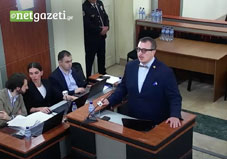The News in Brief
Friday, August 30, 2024
Prepared by Messenger Staff
Representative Warns of Risks to Individuals in Occupied Territories Due to 'Foreign Agents' Law
 Giorgi Burjanadze, a representative of President Salome Zourabichvili in the Constitutional Court, highlighted the dangers of the "Foreign Agents" law, particularly for individuals in Georgia's occupied territories who collaborate with Georgian organizations.
Giorgi Burjanadze, a representative of President Salome Zourabichvili in the Constitutional Court, highlighted the dangers of the "Foreign Agents" law, particularly for individuals in Georgia's occupied territories who collaborate with Georgian organizations.
Burjanadze expressed concern that the law's requirement to disclose the identities of these individuals could jeopardize their safety, as it exposes them to potential risks and endangers their health. He emphasized that human rights work often necessitates confidentiality to protect individuals in sensitive situations, and the new law could lead to severe consequences by making this information public.
"In Georgia, a number of organizations work to document the human rights situation in the occupied territories. There are people who are paid by non-governmental organizations operating in Georgia. These individuals are members of these organizations, and the law stipulates that their names and surnames should be made public.
Sometimes human rights activities require professional confidentiality. For the reason that the names and surnames of persons in dangerous places are kept unknown, the type of information being documented does not become known in order to further use this information by the state of Georgia itself. Naturally, with this register and arrangement, this information can be made public, and the lives and health of those people and members of organizations may be endangered, which can cause irreparable damage," Burjanadze said.
Public Defender Submits Friend of the Court Opinion on 'Foreign Agents' Law
 On August 29, the Public Defender presented a friend of the court opinion to the Constitutional Court of Georgia concerning the controversial "Foreign Agents" law. The opinion argued that the law's stipulations, which require certain organizations to disclose their foreign funding sources, lead to the stigmatization of these groups and obstruct their operations.
On August 29, the Public Defender presented a friend of the court opinion to the Constitutional Court of Georgia concerning the controversial "Foreign Agents" law. The opinion argued that the law's stipulations, which require certain organizations to disclose their foreign funding sources, lead to the stigmatization of these groups and obstruct their operations.
The submission critiques the law's potential for broad interpretation and its monitoring mechanisms, especially regarding access to personal data. It warns that the new requirements could impose an excessive burden on organizations and their employees, potentially undermining their ability to effectively perform their core functions.
The opinion urges the court to consider these factors in its review of the law and to assess its impact on the operational capacity and safety of affected organizations.
Representative Warns of Risks to Individuals in Occupied Territories Due to 'Foreign Agents' Law

Burjanadze expressed concern that the law's requirement to disclose the identities of these individuals could jeopardize their safety, as it exposes them to potential risks and endangers their health. He emphasized that human rights work often necessitates confidentiality to protect individuals in sensitive situations, and the new law could lead to severe consequences by making this information public.
"In Georgia, a number of organizations work to document the human rights situation in the occupied territories. There are people who are paid by non-governmental organizations operating in Georgia. These individuals are members of these organizations, and the law stipulates that their names and surnames should be made public.
Sometimes human rights activities require professional confidentiality. For the reason that the names and surnames of persons in dangerous places are kept unknown, the type of information being documented does not become known in order to further use this information by the state of Georgia itself. Naturally, with this register and arrangement, this information can be made public, and the lives and health of those people and members of organizations may be endangered, which can cause irreparable damage," Burjanadze said.
Public Defender Submits Friend of the Court Opinion on 'Foreign Agents' Law

The submission critiques the law's potential for broad interpretation and its monitoring mechanisms, especially regarding access to personal data. It warns that the new requirements could impose an excessive burden on organizations and their employees, potentially undermining their ability to effectively perform their core functions.
The opinion urges the court to consider these factors in its review of the law and to assess its impact on the operational capacity and safety of affected organizations.
